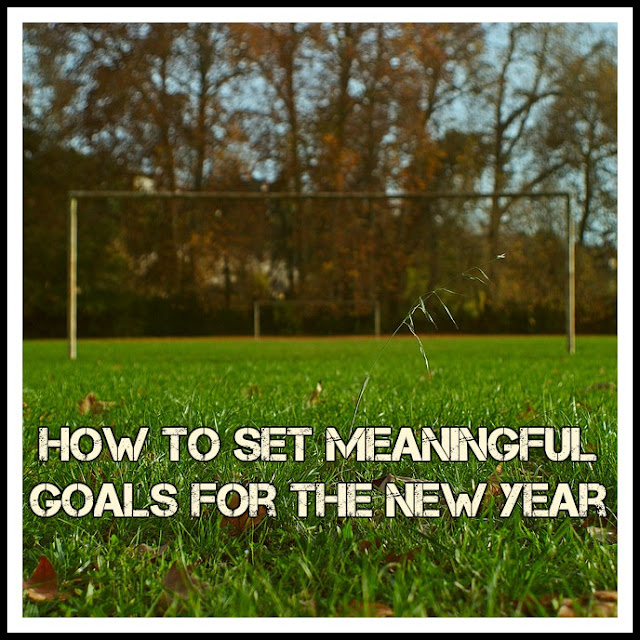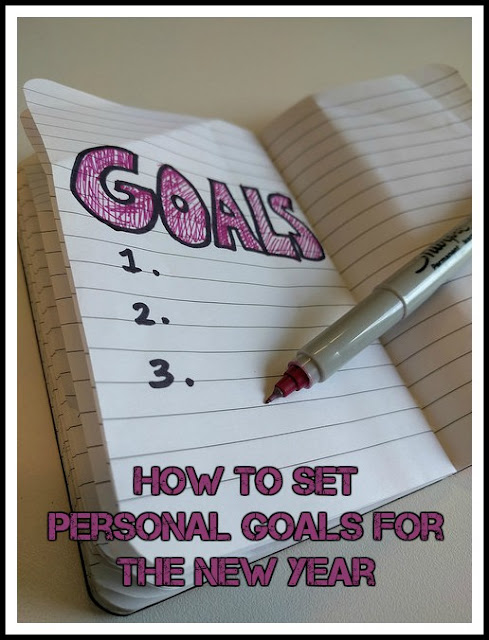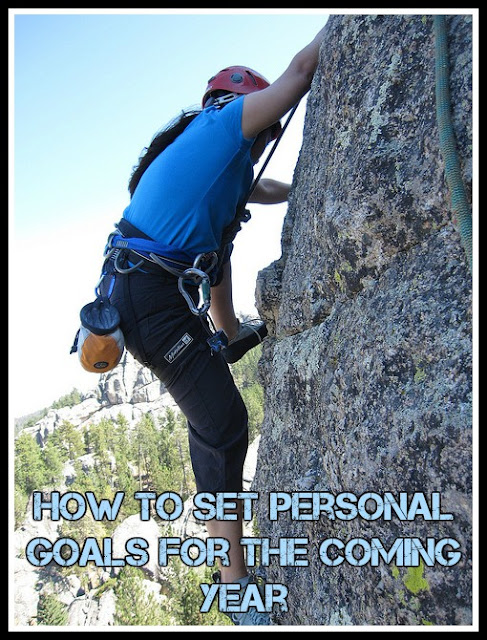It's still November, and I am so excited for the beginning of the new calendar year that I couldn't wait to share with you! This is the time of year when I like to look back at what my goals were for the current year to determine if I achieved them, and to set my goals for the coming year. The past two years, I've spent time with my journal, figuring out what I want to do with the following year.
This year, looking back at the previous noted goals, I realized that I'd made a fatal error in my goal setting. By choosing the goals that I had, I had ensured that I could not achieve them. I want to help you to avoid by telling you a bit about what happened to me.
Then I'll give you some ideas for how to avoid it!
 |
| It's important that your goals for the new year be personal to you. (Source) |
My Story: How I Chose the Wrong Goals
Last year, I was so excited to crack open my journal and to get started! Like many people, I was overwhelmed and worried about "ruining" the book. (And I confess, I did ruin it and then didn't do much with it after that. I've gotten past that, but that's for another post!) When I finally put pen to paper, I found myself so anxious that I went online to see what other people's goals were.
Then I wrote those goals down in my journal.
Their goals I mean. As in, they were somebody else's goals.
When I realized (this year, with a new journal) what I had done, I was so relieved to discover that this was a problem I could solve! I ran straight to the Facebook group and told everybody. The responses brought a lot of relief not only that I was not alone in doing this, but that the discovery was a part of a growth process.
The most important reason that I keep a journal, set goals, and blog is to grow as a human being. (Your reasons may vary, and that's fine!)
This year, I set some special time (and space) aside to work on my Rituals for Living Dreambook by the Dragontree. It's the second year that I'm using the book, and I've already put more (of my own) words into the book than I did last year. The priority was to focus on the things that were important to me and on what motivated me.
When I compared last year's responses to this year's responses, I was surprised to find how much I'd changed -- and how much I'd failed last year's book. It has made me more driven to make the most out of this year's book.
Where Many People Go Wrong When Setting Goals
Right around the holiday season, people start to talk about their "New Year's resolutions." I abandoned the notion years ago, and then last year picked up the idea of dreaming big and setting goals to realize those dreams. I believe in magic, and I believe in the Law of Attraction, but I've never had the confidence to make it work for me. (You'll see all kinds of blog posts and articles about "what you're doing wrong" written by people claiming knowledge but with little to inspire confidence that they've succeeded themselves.)
Now I'm not here to tell you about the Law of Attraction (or magic in any form, for that matter). I'm here to tell you how you can make beginning-of-the-year goals work for you, and what you need to do to make the most of them. I speak from experience, and I can confidently tell you that if you follow these steps, you will be more likely to meet your goals.
Many people do what I used to do: They set their goals based on what they are "supposed" to say, choose, or do. Society tells us that we should eat less and exercise more; It tells us that we should quit smoking; It tells us that we should watch less television; It tells us that we should work harder and save more money.
Now a resolution is not the same thing as a goal: A resolution is a commitment to change a topic in a specified time. A goal is an end that you wish to achieve through planning. The premise, however, is the same. If you're like me and you choose your goals (or resolutions!) based on what you're supposed to want for yourself, you're less likely to follow through because that resolution or goal is not important to you.
 |
| If your goals are personal to you you're more likely to reach them! (Source) |
The Most Important Thing: Keep Your Goals Personal!
As I mentioned, the biggest hurdle that I've faced with regard to meeting my goals was to adopt somebody else's goals. I knew what other people wanted, and I knew what I was supposed to want, and I knew what was (theoretically) realistic for my body and personality. This attitude rooted me in old ways of thinking and prevented me from moving forward with any enthusiasm for the future.
Avoid setting goals because they are popular. I cannot tell you how often, in the previous year, I browsed blogs where the writer talked about her goals in terms of financial success. It's easy to get wrapped up in what others are doing, succumb to peer pressure, and to write down the same goals that others have. Having read these blogs, I promptly wrote down "create a successful blog" as one of my goals.
(I definitely want to have a successful blog, but my motivation for keeping a blog has more to do with writing being a hobby of mine and less to do with the cash flow I receive from the blog. If I can help you in the meantime, all the better!)
Some of my goals are:
Decorate my home with personal artwork.
Maintain my role playing site long-term.
Engage more with my hobbies.
Live a peaceful life.
These are all things that matter to me. I didn't find them on a site with a list of goals, and I didn't come up with them while browsing other blogs. If you can set goals that are personal and meaningful to you, then you will find it easier to achieve those goals.
So how do you go about figuring out what's important to you? If you don't have your own Rituals for Living Dreambook (and if you don't, you should buy one as soon as possible!), then here are some steps that I would follow:
- Think about the things that make you happy. One of the reasons we're so unlikely to follow through with New Year's resolutions is that instead of focusing on what makes us happy, we try to stop doing those things! Spend some time thinking about the things that make you happy. Do you enjoy making music? Being in nature? Working on cars? Whatever makes you happy, take that into consideration when setting your goals. Write them down.
- Think about the things that are important to you. Setting goals is at least in part about your priorities. If you know what's most important to you, then it's easier for you to put your energy into those things. Is it your hobbies? Your marriage? Your family? Your career? Once you know what's most important to you, then you will know where to focus your attention in setting your goals. Once you know what's most important to you, write it down.
Once you've done these things, it should be easier for you to assess your own priorities and to avoid including goals which do not pertain to your life. Just make sure, as you do this, that you're thinking about what you want and not what others want for you (or, alternatively, what you want for them). Your goals ought to be about you!
 |
| It's important to write down your goals. (Source) |
Steps for Setting Goals You'll Stick With
- Determine your priorities. In order to achieve your goals, those goals have to be important and meaningful to you. Think about what makes you happy and what's important to you (as outlined above). Goals should always focus on the things that are most important in your life. Not only is anything else background noise, but you're less likely to achieve goals that you don't care about!
- Write down the things that are important to you. As I said before, take the time to write down the things that are the most important to you. It helps the mind to focus on something that you've written down, and this will act as a point of reference. One thing I loved about my last year's journaling was the ability to return to it this year and see how I've changed!
- List the things you want to achieve. This can be anything -- and don't let me discourage you! If you want to lose 50 pounds, by all means, you should put that on your list! But if weight loss isn't high up on your list of priorities and you're more interested in catching up on all of your favorite television shows in the coming year, then write that down. For the purposes of this exercise, think about what you'd like to accomplish this year. I'll talk about long-term goals in another post.
- Write down the steps to each goal. If your goal is to run (or walk) a marathon in the coming year, then you should write down the action steps that you'll take to achieve this goal. You might participate in training, add vitamins to your daily routine, or other steps. Listing your steps turns your goal into a plan. You're more likely to follow a concrete plan than to achieve an abstract goal without one!
Try not to worry, in the beginning, about whether or not your goals are 'realistic.' You might be surprised how 'realistic' some goals become when you start to set out your action plan for achieving them. The most important thing to remember is to concentrate on action steps which you can take yourself and which do not require someone in your family or circle of friends to take steps on your behalf.
If you liked this post, please be sure to comment, like, share, and pin!
 |
| Keep your goals personal and targeted, and you're more apt to succeed! (Source) |
Comments
Post a Comment